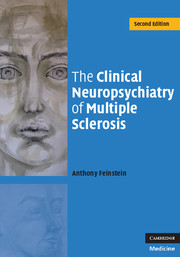Book contents
- Frontmatter
- Contents
- Acknowledgement
- Foreword
- 1 Multiple sclerosis: diagnosis and definitions
- 2 Depression: prevalence, symptoms, diagnosis and clinical correlates
- 3 Depression: etiology and treatment
- 4 Multiple sclerosis, bipolar affective disorder and euphoria
- 5 Multiple sclerosis and pseudobulbar affect
- 6 Multiple sclerosis and psychosis
- 7 Cognitive impairment in multiple sclerosis
- 8 The natural history of cognitive change in multiple sclerosis
- 9 Cognitive impairment in multiple sclerosis: detection, management and significance
- 10 Neuroimaging correlates of cognitive dysfunction
- 11 Multiple sclerosis, disease-modifying treatments and behavioral change
- 12 Multiple sclerosis: a subcortical, white matter dementia?
- Index
- Plate section
- References
8 - The natural history of cognitive change in multiple sclerosis
Published online by Cambridge University Press: 13 August 2009
- Frontmatter
- Contents
- Acknowledgement
- Foreword
- 1 Multiple sclerosis: diagnosis and definitions
- 2 Depression: prevalence, symptoms, diagnosis and clinical correlates
- 3 Depression: etiology and treatment
- 4 Multiple sclerosis, bipolar affective disorder and euphoria
- 5 Multiple sclerosis and pseudobulbar affect
- 6 Multiple sclerosis and psychosis
- 7 Cognitive impairment in multiple sclerosis
- 8 The natural history of cognitive change in multiple sclerosis
- 9 Cognitive impairment in multiple sclerosis: detection, management and significance
- 10 Neuroimaging correlates of cognitive dysfunction
- 11 Multiple sclerosis, disease-modifying treatments and behavioral change
- 12 Multiple sclerosis: a subcortical, white matter dementia?
- Index
- Plate section
- References
Summary
The initial cognitive studies in MS were concerned with establishing the prevalence and nature of the deficits. Once these objectives had largely been attained, attention could be directed at other areas such as the pathogenesis, natural history, clinical significance and treatment of cognitive difficulties. This chapter will review the findings relating to one of these aspects, namely the natural history of cognitive decline in MS, and attempt to answer the following questions. How early in the illness does cognitive dysfunction become apparent? How do these changes progress over the years or, indeed, do they progress? With MS frequently running a relapsing–remitting course characterized by disease exacerbations and variable degrees of recovery, how do these changes affect cognition?
The onset of cognitive dysfunction
Canter (1951) had shown that a general decline in intellect occurred within four years of developing MS. However, it was unclear whether cognitive decline coincided with the onset of neurological symptoms or at some point thereafter. In addition, the limited scope of his psychometric battery and the paucity of objective measures of neurological disease curtails the study's conclusions.
Clinically isolated syndromes of the type seen in multiple sclerosis
In order to assess how early cognitive abnormalities become apparent, research has been directed at patients with clinically isolated syndromes (CIS) of the type seen in MS. These syndromes may present as optic neuritis, brainstem or spinal cord syndromes (Ch. 1).
- Type
- Chapter
- Information
- The Clinical Neuropsychiatry of Multiple Sclerosis , pp. 145 - 154Publisher: Cambridge University PressPrint publication year: 2007



